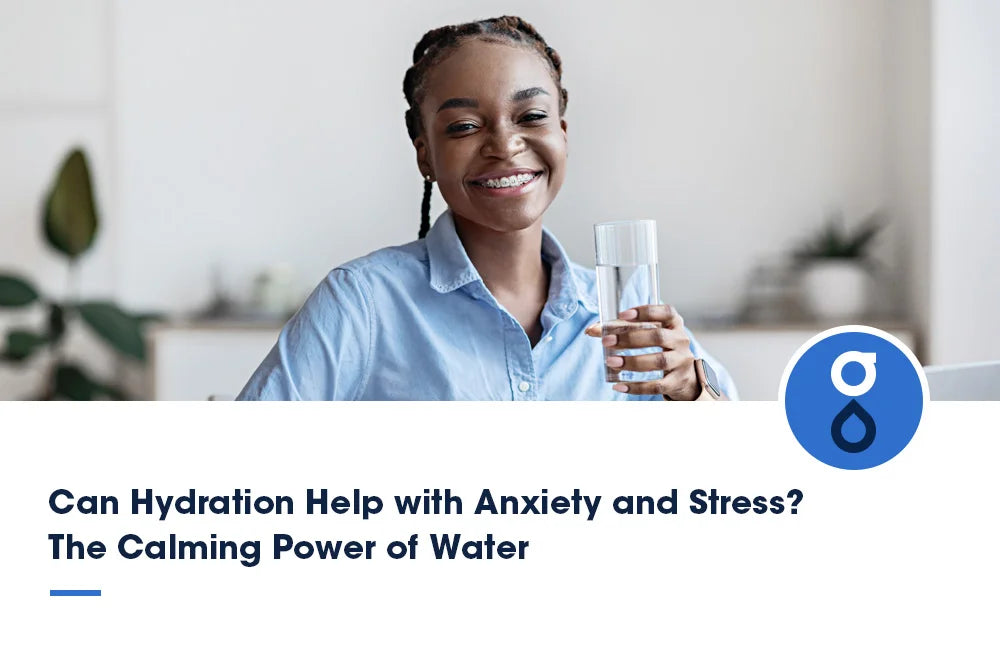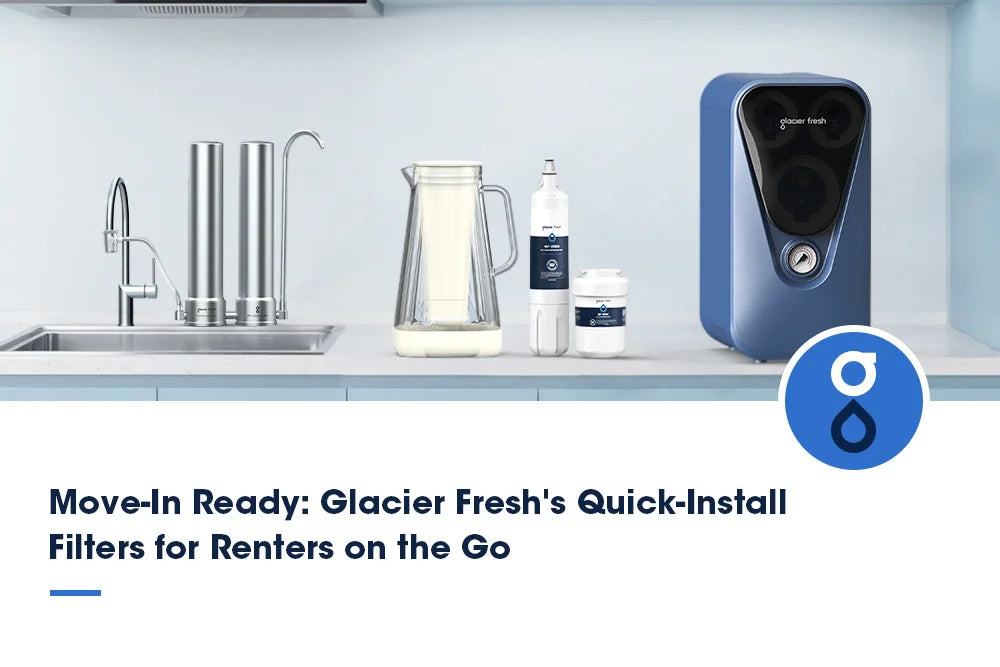Table of Contents:
Understanding anxiety and stress
The connection between hydration and mental well-being
How can dehydration can worsen anxiety and stress?
The claming effects of water on the mind and body
Practical tips for hydration & stress management
Foods and beverages that support hydration and mental calm
Conclusion
In today’s fast-paced world, stress and anxiety are all too common. Whether it’s the pressure of work, financial worries, or simply trying to keep up with life’s responsibilities, many people are searching for natural, effective ways to ease their minds. While practices like meditation, exercise, and therapy are often discussed, one surprisingly powerful remedy often goes overlooked—hydration. Yes, something as simple as drinking enough water might just hold the key to better mental well-being.
Let’s dive into the science behind hydration and its calming influence on the body and mind.
Understanding anxiety and stress
 Anxiety and stress are natural responses to perceived threats or pressures. While occasional stress is a normal part of life, chronic stress and anxiety can take a serious toll on our mental and physical health. Symptoms can range from irritability and fatigue to trouble sleeping and even digestive issues.
Anxiety and stress are natural responses to perceived threats or pressures. While occasional stress is a normal part of life, chronic stress and anxiety can take a serious toll on our mental and physical health. Symptoms can range from irritability and fatigue to trouble sleeping and even digestive issues.
Anxiety, in particular, is often characterized by excessive worry, restlessness, and difficulty concentrating. Complex interactions between brain chemistry, hormones, and environmental triggers drive it. One lesser-known contributor to these emotional states? Hydration—or the lack thereof. Knowing exactly how much water your body needs daily is crucial for maintaining emotional balance, which is why calculating your personal hydration requirements based on your activity level and climate should be a priority
The connection between hydration and mental well-being
Our bodies are composed of roughly 60% water, and the brain is even more water-dense—up to 75%. Water plays a crucial role in every bodily function, including mood regulation. When properly hydrated, our cells—especially brain cells—can function optimally. Neurotransmitters are more effectively produced and transmitted, hormones are better regulated, and our cognitive processes remain sharp.
On the flip side, even mild dehydration can impair cognitive performance, reduce energy levels, and elevate feelings of anxiety. A 2018 study found that individuals who regularly consumed adequate amounts of water had a lower risk of anxiety and depression. While hydration isn’t a cure-all, it’s clear that water has a foundational role in emotional resilience.
How can dehydration can worsen anxiety and stress?

Dehydration is sneaky. By the time you feel thirsty, you’re already mildly dehydrated. And mild dehydration can have surprisingly significant mental and emotional consequences.
When your body lacks water, it can lead to an increase in cortisol, and elevated cortisol levels can result in physical and emotional symptoms. Cortisol—the body’s primary stress hormone—rises. This creates a feedback loop: as your body feels stressed from dehydration, your anxiety levels can spike, compounding existing mental tension.
Here are a few ways dehydration directly contributes to anxiety and stress:
- Impaired brain function: Without adequate hydration, your brain can shrink in volume, reducing efficiency. This can impair focus and decision-making, both of which are often already challenged during anxious episodes.
- Fatigue and irritability: Dehydration reduces blood flow and oxygen to the brain, leading to feelings of tiredness and moodiness.
- Increased heart rate: Dehydration can cause your heart to work harder, mimicking physical symptoms of panic attacks and increasing perceived stress.
Simply put, when your body is stressed by dehydration, it’s harder to feel calm and in control.
The claming effects of water on the mind and body
Water doesn’t just support the brain on a biological level; it also has psychological effects.
Think of the soothing sound of waves crashing on the shore, the quiet rhythm of a waterfall, or the warmth of a calming bath. Water has long been associated with tranquility and renewal in cultures around the world. Being in, near, or simply interacting with water can significantly reduce cortisol levels and promote relaxation.
Here are some water-based ways to reduce anxiety:
- Hydration: Sipping cool water slowly can have an immediate calming effect during moments of anxiety.
- Baths and showers: Warm water helps relax tense muscles and promotes a sense of safety and comfort.
- Water environments: Visiting natural bodies or listening to water sounds can help lower heart rate and improve mood.
These benefits highlight that water isn’t just physically essential—it’s emotionally nourishing, too.
Practical tips for hydration & stress management

Staying hydrated might sound easy, but busy lifestyles, caffeine, and forgetfulness can all get in the way. Here are a few tips to help you make hydration part of your stress-reducing routine:
- Start your day with water: Drink a glass first thing in the morning to jumpstart your system.
- Keep a bottle with you: Whether at your desk, in your bag, or the car, having water nearby increases the likelihood you'll sip regularly.
- Infuse for flavor: Add cucumber, mint, lemon, or berries to your water to make it more appealing without added sugar.
- Set reminders: Use a hydration app or phone alarm to prompt you to drink water throughout the day.
- Pair hydration with calming rituals: Drink tea while journaling or sip water while meditating or deep breathing.
These small shifts can make hydration a meaningful part of your self-care practice.
Foods and beverages that support hydration and mental calm
Hydration doesn’t just come from water. Many foods and beverages contribute to your daily fluid intake—and some also promote mental calm.
Hydrating foods
- Cucumber (96% water)
- Watermelon (92% water)
- Strawberries (91% water)
- Celery (95% water)
- Lettuce and leafy greens
These foods also contain electrolytes and antioxidants that support overall health.
Calming beverages
- Herbal teas: Chamomile, lemon balm, and lavender tea have natural calming effects.
- Coconut water: Rich in electrolytes and hydrating.
- Warm milk: Contains tryptophan, which can promote relaxation and sleep.
Avoid excessive caffeine and sugary sodas, which can contribute to dehydration and mood swings.
Feeling Stressed? The Simple Solution Might Be a Glass of Water
While hydration might not be the first thing that comes to mind when you think about managing anxiety and stress, its role is both profound and underrated. Proper hydration helps regulate mood, improve cognitive function, and prevent the physiological symptoms of stress from spiraling out of control.
By making water a more central part of your wellness routine, you’re not just caring for your body—you’re also nurturing your mind. Whether you sip herbal tea, enjoy a warm bath, or simply make sure your water bottle is always within reach, the calming power of water is a gentle, effective tool in your mental wellness toolkit.
So, the next time you feel overwhelmed, ask yourself a simple question: Have I had enough water today? Your mind might thank you for it. Follow Glacier Fresh to find more water filtration solutions.
















